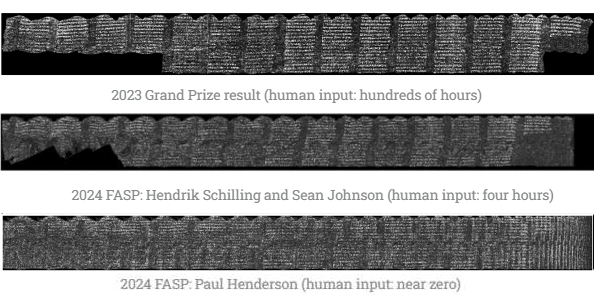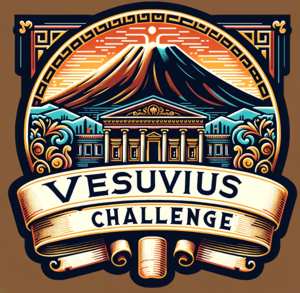| Vesuvius Challenge 2024 Concludes |
| Written by Sue Gee |
| Sunday, 02 February 2025 |
|
Two submissions, from Hendrik Schilling and Sean Johnson and from Paul Henderson for the Vesuvius Challenge First Augmented Segmentation Prize have each been awarded $30,000. The 2024 Grand Prize of has not, however, been claimed. The Vesuvius Challenge started in March 2023. Its aim is to read the contents of physically impenetrable Herculaneum Papyri burnt by fire and then buried under volcanic ash when Mount Vesuvius erupted in 79 AD. The seemingly impossible task of recovering the contents of what appear to be lumps of charcoal is being tackled using computer vision and machine learning. Prior to being engulfed in molten lava when Mount Vesuvius erupted the object pictured above was a papyrus scroll so to read what is written inside involves specific tasks, all of which have to be done without damaging the charred lumps that were initially recovered in the 16th century from the site in Herculaneum. I've covered it from the outset, read Can ML Unlock The Secrets of the Herculaneum Scrolls? if you need the background. Although I've written about the specific tasks involved in the challenge - scanning the scrolls, segmentation, ink detection and letter recognition - I admit it is difficult to understand. This TED talk by Youssef Nader, and Julian Schilliger, two members of the three-man team that won $70,000 of the 2023 Grand Prize, explains all these terms with really helpful visualizations and is certainly worth watching: After the success achieved in 2003, which exceeded the stated hurdle of producing images of visible and legible text from four passages of a scroll, the Grand Prize task for 2024 was to to read 90% of each of four scrolls that had already been scanned. This proved to be too big an ask and although many monthly open source prizes that made progress towards this goal were handed out, by the time the 2024 competition closed the, not only the Grand Prize of $20,000 was still on the table, as were the $60,000 prizes for the finding the title of Scroll 1 and the first letters in Scrolls 2, 3 and 4 as it had not been possible to conclusively recover text from Scrolls 2, 3, or 4. At the very end of the contest period, there were two submissions for the $100,000 First Automated Segmentation Prize, which was the reproduce the 2023 Prize result faster. However, while both submissions were indeed faster, they fell short of matching the amount of text that was required. This led to prizes of $30,000 being awarded for two submissions which are recognized as complementing each other in a way that provides a good basis for further work. The submission from Hendrik Schilling and Sean Johnson centred around volumetric segmentation, and subsequent surface tracing. Instead of needing human input of hundreds of hours, it reduced the time taken to four hours. The submission from Paul Henderson, a relative newcomer to Vesuvius Challenge, built on Schilling and Johnson's work by using the outputs of their segmentation models as its initial inputs. Then a a spiral is deformed to fit the data across the entire scroll. The blog post comments: We love the elegance of this solution, which represents the first serious segmentation result from a global optimization over the entire scroll. The codebase is small and computationally efficient relative to many of the bottom-up methods, and should provide a fruitful environment for experimentation and further progress.
More InformationAwarding the amazing autosegmentation work from 2024 Related ArticlesSuccess For Vesuvius Challenge Exciting Progress In Vesuvius Challenge Vesuvius Challenge - Progress and Prizes Can ML Unlock The Secrets of the Herculaneum Scrolls?
|
| Last Updated ( Sunday, 02 February 2025 ) |



